The Top 10 Notion Alternatives Your Team Should Try
Notion is an incredibly powerful tool. You can use its simple block-based logic to build anything your team needs. But while Notion’s flexibility means it can plug many holes in your tool stack, the jack-of-all-trades approach means it can underperform compared to other dedicated tools. That alone might be enough to send you looking for a Notion alternative.
In this post, we’ll break down 10 of the top Notion alternatives — as well as their price — so you can start your search on the right foot.
What is Notion?
Notion bills itself as an all-in-one workspace. It uses a system of templates to allow its users to quickly set up Notion pages that can solve all kinds of problems. Need a budget spreadsheet, a meeting tracker, or a project management system? Notion does all the above and more. With the right template, you can get started in just a few clicks.
If you prefer building things yourself, Notion uses a simple block-based architecture that’ll be instantly familiar if you’ve ever built a website or managed content on a platform like WordPress.
Whether you use Notion’s templates or build something of your own, the tool shines in these areas:
- Building databases
- Replacing multiple tools in your stack
- Managing projects
With that in mind, let’s cover some Notion alternatives for each function.
Notion database alternatives
Notion’s databases are easy to set up, completely customizable, and often serve as the backbone of other Notion pages. As such, any alternative you want to use for your databases should have some of that flexibility.
Microsoft Excel
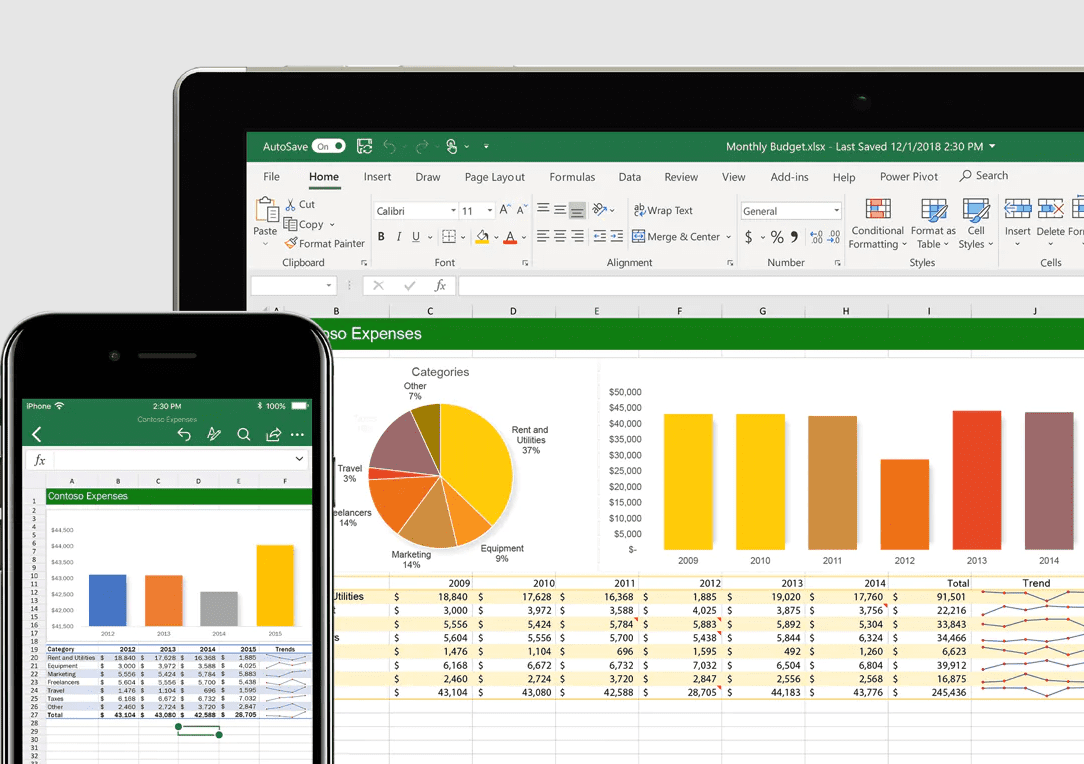
The original spreadsheet tool and still a titan of the category, Excel is a strong Notion alternative. It offers organizational power and number-crunching features that set the stage for all the tools that came after it.
Excel’s main advantage compared to Notion is that it’s a dedicated spreadsheet tool. As such, there are some things that it can do that Notion either struggles to replicate or can’t do at all.
That said, the learning curve for tools like Excel can be pretty steep. If you’re ready to roll up your sleeves and spend some time figuring out how it works, you’ll get a lot more out of it.
Pricing
You can use Microsoft Excel for free through a browser, but the desktop app starts at $5.00/month for one user. Prices scale up from there for teams.
Google Sheets
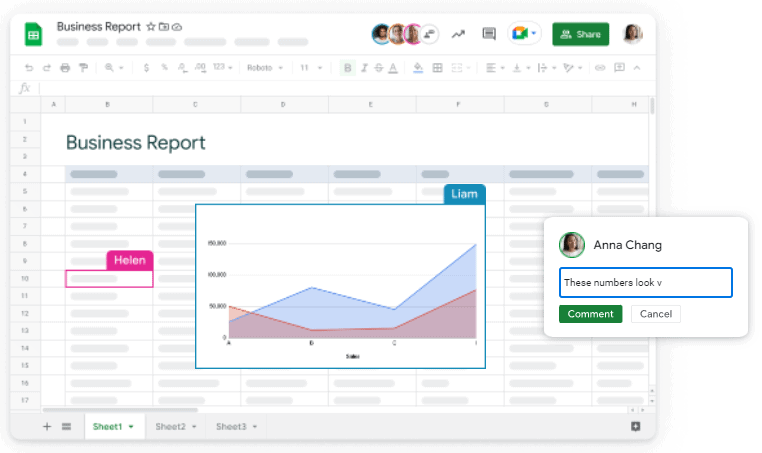
While it’s not the original spreadsheet tool, Google Sheets is the tool of choice for many workplaces. Since you can start using it for free without worrying about the need for a desktop app, the barrier of entry is pretty low.
Much like Excel, Google Sheets’s main advantage over Notion is its single-minded focus on spreadsheets. That lets it do things that Notion can’t really keep up with. But since you can add dropdown lists and similar things to your spreadsheet, you can replicate Notion functionality in Google Sheets.
Still, Notion can shore up other weaknesses in your tool stack while giving you databases that are more than serviceable.
If you’re looking for the best of both, you can connect them through our Google Sheets to Notion integration.
Pricing
Google Sheets is always free to use, but you’ll need a Google Workspace plan if you need more than 15GB of storage. These plans start at $6/user per month.
Zoho Sheet
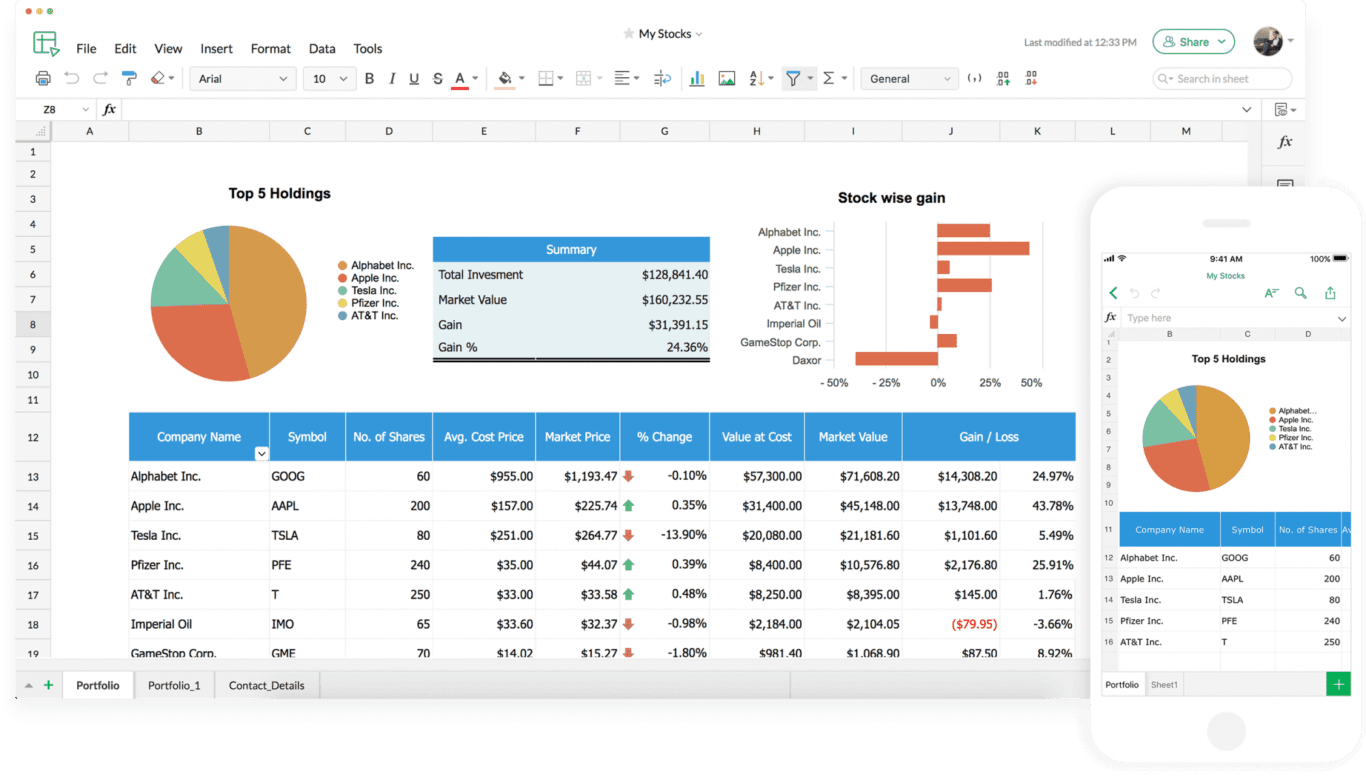
With Microsoft Excel as the first spreadsheet tool and Google Sheets as the most popular, Zoho Sheet comes in third as a rapidly growing option. You’ll find most of the features you expect in this spreadsheet tool, but some of them are a bit lacking when compared to the two titans of this tool category.
As a dedicated spreadsheet tool, Zoho Sheet will let you do more than a jack-of-all-trades like Notion. But on top of sharing the learning curve of its primary competitors, Zoho Sheet doesn’t necessarily perform as well as they do.
Pricing
Zoho Sheet has one primary advantage over Excel and Sheets: price. Starting at $3/user per month, it’s a strong option for organizations that need to be a bit more budget-conscious.
Airtable
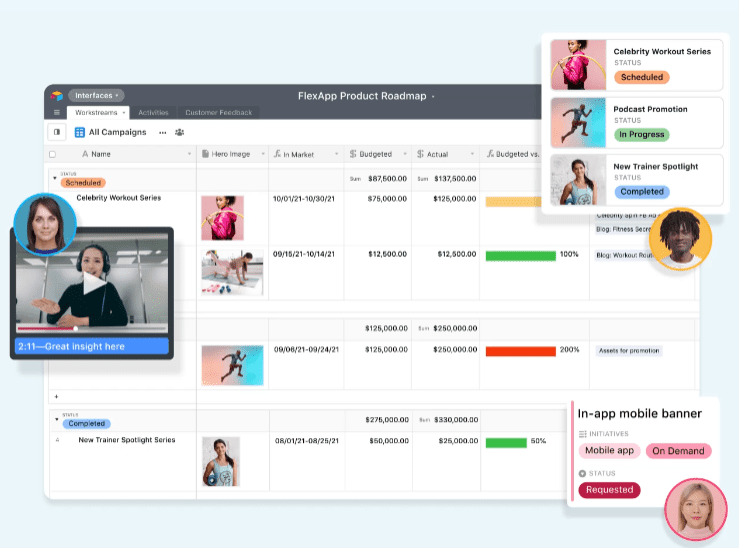
Airtable goes beyond the standard spreadsheet tool. While it can do a lot of what Excel and Google Sheets can, it veers a bit closer to Notion when it comes to pure customizability. Airtable’s databases are powerful, customizable, and a great platform for sharing knowledge and storing data. But Airtable shines as the backbone of your workflows.
With Airtable, you can build custom workflows, Kanban boards, databases, and more with little technical knowledge. Its main advantage over Notion is just that; its sheer strength when used to power your workflows.
Notion wins out in the onboarding department, however. Its block-building system is much easier to learn than Airtable’s more advanced features.
Pricing
Airtable’s free plan is enough for five creators to build an unlimited number of bases with up to 1,200 records each. Its paid plans start at $10/user per month, and support more records, bigger attachments, and more.
Pro tip: start off with the right templates
One of the best ways to start off on the right foot when adding a database tool to your stack is having the right template. Whether you’re looking to manage a project in a database tool, build a report, or run whatever workflow you need, you’ll find a template for it here:
Notion project management alternatives
Notion’s flexibility means that it can be a great resource for project managers. But, if you’re looking for a Notion alternative that’s more specialized in this area, you’ll find many strong contenders.
Trello
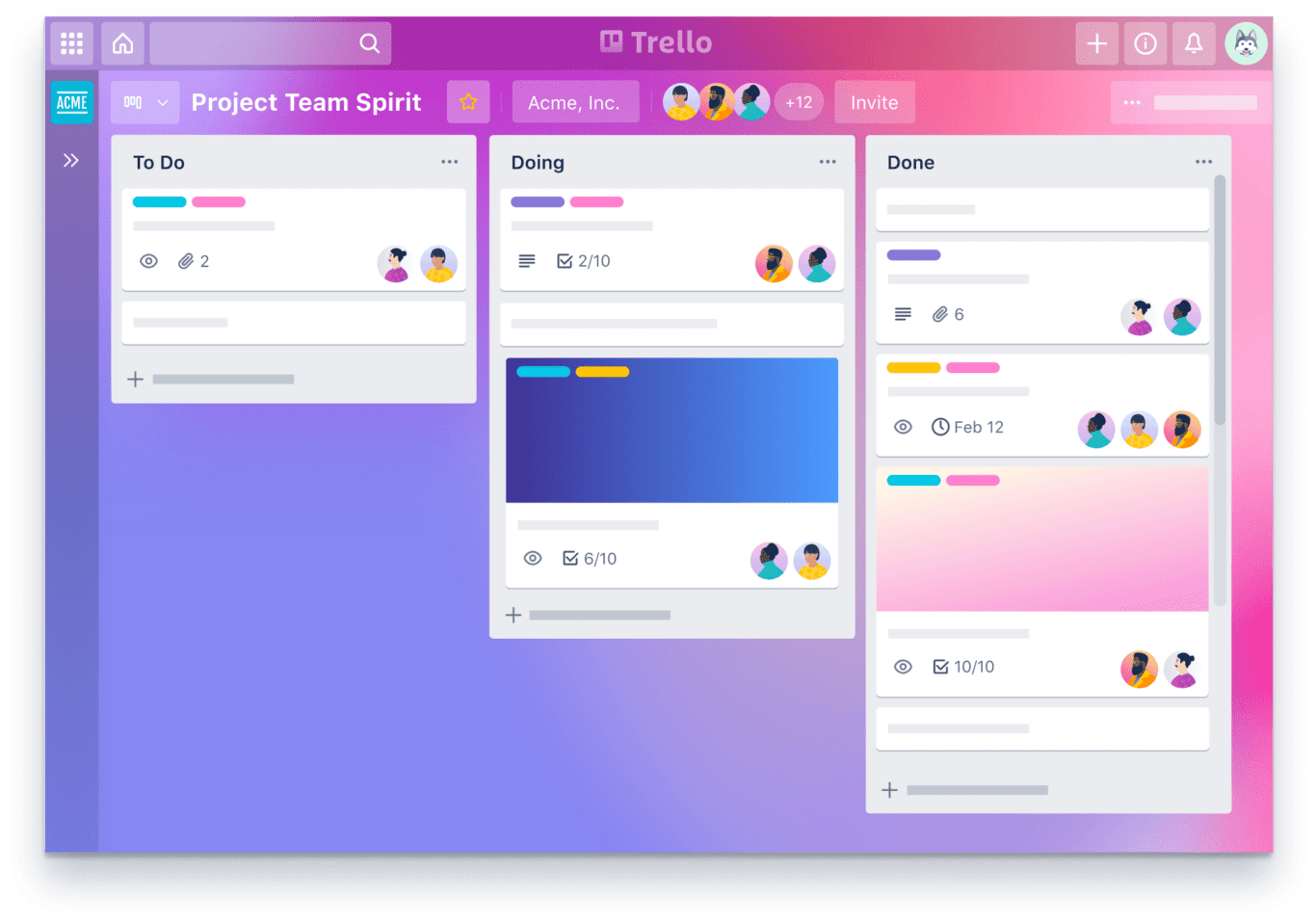
Probably one of the most popular project management tools out there, Trello leverages the Kanban board methodology, turning your tasks into cards that move along a visual board as you work on them. Its flexibility and ease of use are its main strengths, which make it a great Notion alternative.
While you can easily set up a similar Kanban board in Notion with the right template, Trello makes it a lot easier to get started quickly. But if you need more than a Kanban board from your project management tool, Trello might not be the best alternative for you.
Pricing
Trello has a robust free plan that’s a great place to start for most teams. However, if you want access to features like custom fields and advanced checklists, you’ll need one of their paid plans, which start at $5/user per month.
Asana
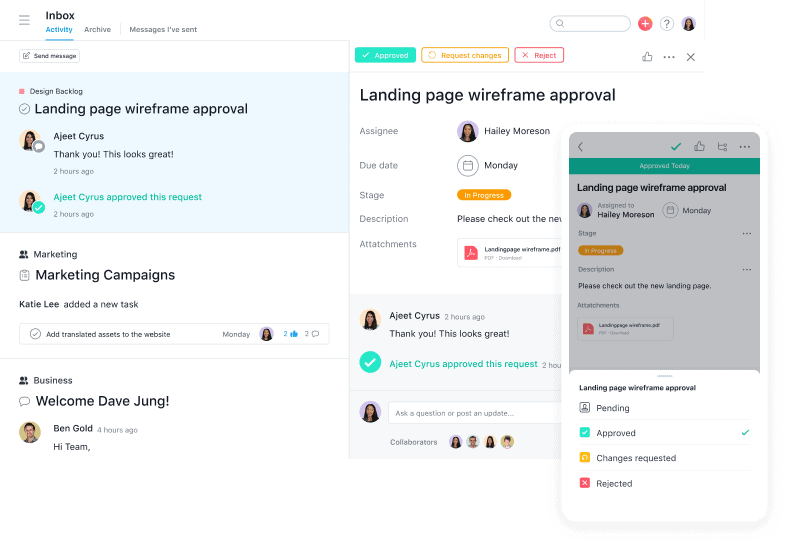
Asana is one of the biggest players in the project management game, making it a natural Notion alternative. The platform can support deep task hierarchies, easily connect multiple projects, and power all kinds of workflows for your teams. It’s a much more flexible option than Trello, since you can choose to display your projects with Kanban boards, lists, Gantt charts, and more.
If you want a dedicated project management tool that lets you do more in less time, Asana might be one of the best Notion alternatives out there. However, its steep cost can be a deterrent for teams with smaller budgets.
Pricing
Asana is one of the most expensive Notion alternatives on this list at $10.99/user per month. It does have a free plan, but it lacks some of Asana’s flagship features like custom fields, timeline views, and unlimited dashboards.
Jira
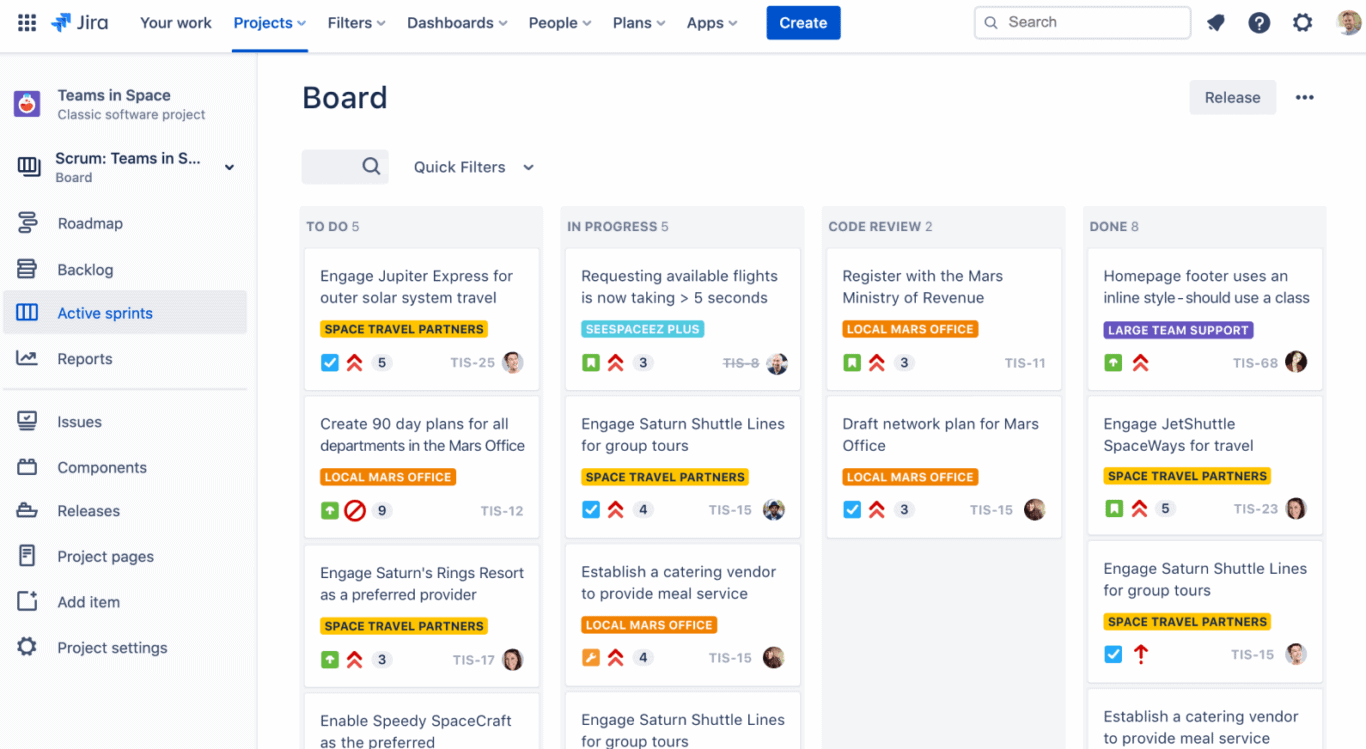
Popular among software teams, Jira is a project management tool built with technical teams in mind. The Agile methodology, so common among developers and product managers, is baked into every corner of the platform. You can plan your sprints, groom your product backlog, and check all the other boxes on your product manager’s list.
If you’re leading a software team, Jira is purpose-built for you and hard to ignore as a Notion alternative. Still, many users have complained that getting used to Jira’s interface can be a problem, especially since it changes often.
Pricing
Jira offers a free plan for up to 10 users, though they won’t have access to the tool’s more advanced features. For that, you’ll need one of their paid plans, which start at $7.50/user per month.
Notion all-in-one alternatives
One of Notion’s greatest strengths is its flexibility. While it might not excel when compared to a dedicated spreadsheet or project management tool, it can replace more tools in your toolbox than they can. That said, it’s not the only option in this regard, either. Here are some strong all-in-one Notion alternatives.
ClickUp
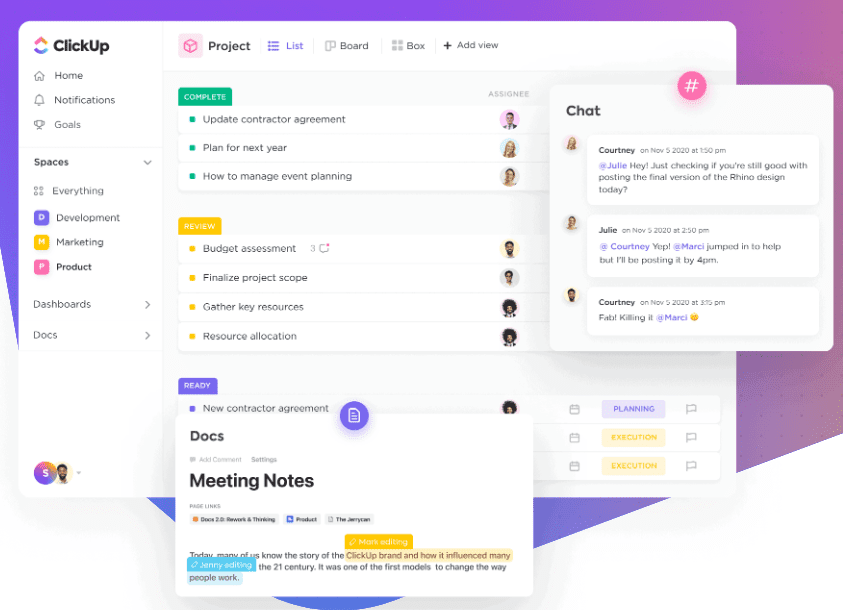
Go to ClickUp’s home page and you’ll find this bold claim: one app to replace them all. Moreso than possibly any other app, the people behind ClickUp are striving to build a platform that can become your team’s one-stop shop for the majority of their needs. Its primary focus is as a project and task management tool, but it also supports creating collaborative documents, note-taking, reporting, and more.
One place where ClickUp shines compared to Notion is its deeper task management system. While you can technically build something similar in Notion, it takes a lot more work to get up and running. That said, ClickUp might claim it will replace all your tools, but it’s not quite as customizable or “buildable” as Notion.
Pricing
ClickUp’s free plan is a strong option for teams of any size, but many of its dedicated reporting and automation features are locked behind its paid plans. These plans start at $5/user per month.
monday.com
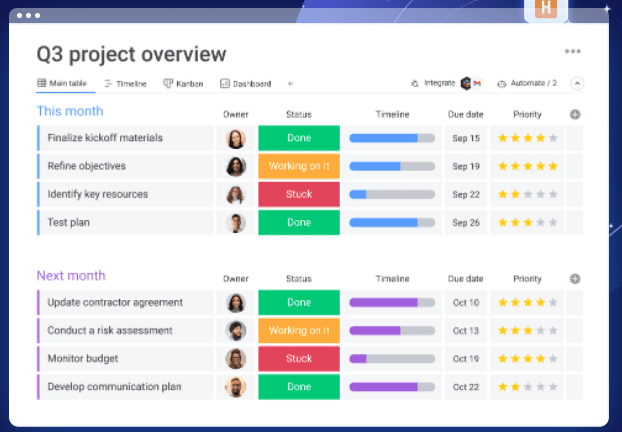
Much like ClickUp, monday.com aims to not just replace most of the tools in your stack, but power the rest of them as well, calling themselves a “Work OS.” It’s easy to see why. Their all-in-one platform can be used by revenue teams, developers, project managers, marketers, and more to streamline their workflows and get more done. With document support, automation, and other features, it can do a lot more than your standard project management tool.
Like ClickUp, monday.com has a deep task management system that would be difficult to replicate in Notion. This comes at a cost, however, since many monday.com users bemoan the tool’s steep learning curve.
Pricing
While monday.com is free for up to two users, teams will need to get one of their paid plans. These start at $8.00/user per month.
Basecamp
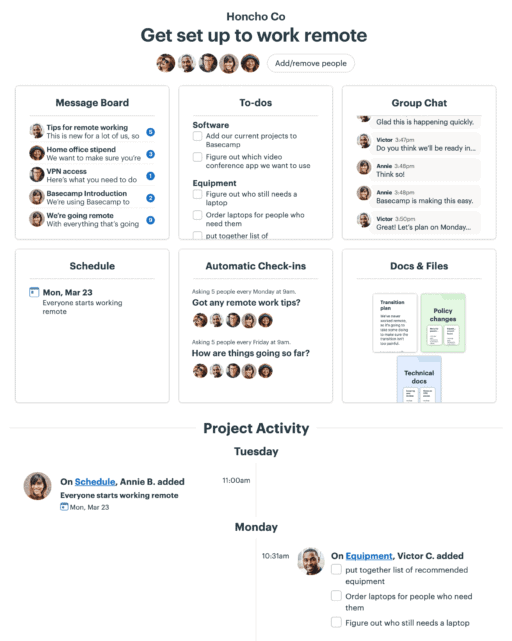
Basecamp has been around for more than a decade, making it venerable compared to many of the tools in this list. At its core is the to-do list, which Basecamp users can take advantage of to manage projects and track their work. Basecamp is more than just a glorified to-do list, though. It includes a scheduling function, so your teams can keep track of their calendar without leaving the tool. You’ll also have access to a chat function and document organization.
Basecamp is a popular tool for agencies and other organizations that work with external clients. If that describes you, then you’ll likely find features in this tool that are tailored to your situation when compared to Notion. That said, the old-school interface can be hard to navigate, and the learning curve is a bit steep.
Pricing
Unlike many tools in this list, Basecamp charges a flat fee. That means your bill doesn’t grow along with your team. Basecamp’s Business plan is a flat $99 a month.
Know your Notion options
As your team grows, so will your tool stack. Notion is a great option for quickly building solutions to your team’s problems, but it’s not always the best option. Whether you’re looking for a stronger project management tool, a database, or any other specialized tool, sometimes you need to pick a dedicated platform.


